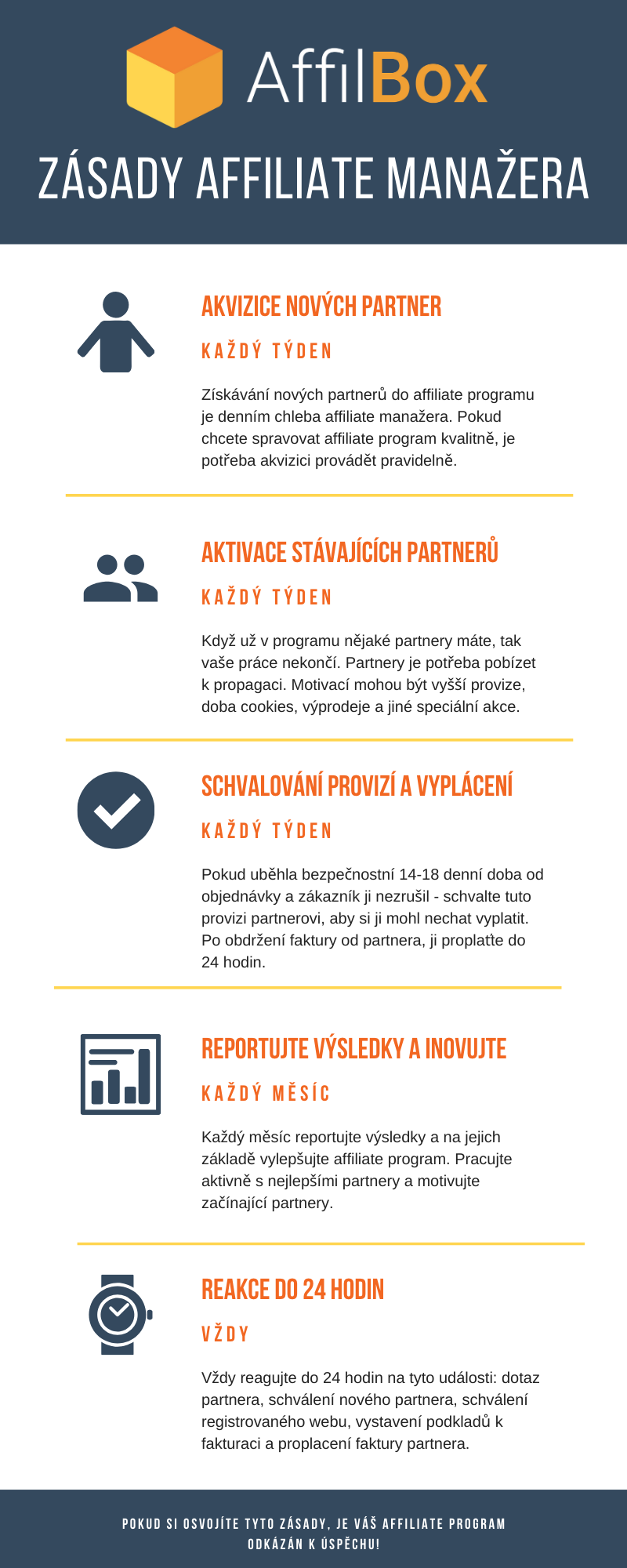What is affiliate marketing?
Affiliate (commission) marketing is a type of internet marketing focused on performance (sales). Merchants (hereafter referred to as partners or affiliates) direct customers to the advertiser’s website, where they make the desired conversion and the partner then receives a commission.
The required conversion does not have to be just a completed order, but also, for example, filling in an enquiry form, leaving an email address to receive email newsletters or simply viewing an advertising element.
Partners most commonly use their own websites, PPC advertising, social media advertising, email marketing and sometimes even the telephone (if the conversion can be tracked online)
Chapters
Who is who in affiliate marketing?
Who is an affiliate partner?
A person or company that promotes an advertiser’s product or service for the purpose of earning a commission on sales.
Types of affiliate partners:
- interest blogs,
- product catalogs,
- review sites,
- cashback portals,
- coupon sites,
- online advertising (PPC) specialists,
- Google shopping specialists,
- remarketing/retargeting specialists.
Who is an affiliate advertiser?
Affiliate advertiser is a person or business that sells something online and wants to get onlinemarketers to promote their services or products.
Explaining Affiliate by Podcast
Who is an affiliate manager?
Affiliate manager is a specialist who acts as a liaison between the affiliate and the advertiser. His job is to ensure the smooth functioning of the affiliate program and communication with both parties. You can read what the job of an affiliate manager entails in our article about affiliate management half an hour a day.

History of affiliate marketing
The world’s most famous affiliate program is also the world’s most famous online store. It is Amazon.
Amazon was at the birth of affiliate marketing, however, it was not the first program. The very first affiliate program was launched by CDnow in 1994. This program focused on selling CDs and music.
Other famous affiliate programs include:
In the Czech Republic, the first purely Czech affiliate program was the one opened by the travel agency Invia.cz, which can be classified as sometime around 2005. This affiliate program is still one of the best known and best earning programs on the Czech market today.
Today there are tens of thousands of affiliate programs abroad and thousands of programs in the Czech Republic.
Over the years of affiliate marketing, industries that attract affiliate marketers with their high commissions and therefore high profits have stood out.
The most profitable affiliate marketing industries are usually:
- fashion,
- furniture,
- pharmacy,
- online casinos,
- travel,
- adult industries.
Philosophy of affiliate marketing
There are a lot of projects and e-shops on the internet that sell their product or service. Often these projects are “one man shows” i.e. one person takes care of setting up the company, managing it, distributing it, watching the prices, watching the competition, etc… If that person still wanted to create a stable and sustainable marketing strategy, it would likely be very challenging, if not impossible.
But what if that same entrepreneur had an army of marketers who know marketing and can bring in new visitors every month?
In effect, new customers as well? What if these merchants didn’t want a monthly salary but only a percentage for the goods or service sold? Then the entrepreneur can focus on other critical aspects of his business and leave the sales part purely to the outside merchants and that is the principle of affiliate marketing.
The genius of the whole principle is the fact that the merchant only pays for orders placed – this allows him to control his expenses, cashflow and cost to sales ratio (CTR).
Affiliate marketing technically
Affiliate marketing is referrals over the internet. Affiliates recommend an advertiser’s product or service to their visitors on their website. If the visitor is interested, they click through to the advertiser’s website.
Every single click brought in from a partner is marked and tracked by cookies in the web browser.
If a visitor makes the desired conversion this is recorded in the affiliate software. Based on individual conversions, performance commissions are paid to the affiliate.
Second-affiliate-marketing:
PPS (PPA) – pay per sale or pay per acquisition is the most common form of affiliate marketing. The advertiser pays a commission only for the sale made.
PPL – pay per lead is a form of affiliate marketing where the advertiser pays for contacting a potential customer. The principle is that a form or pop-up is placed on the affiliate partner’s website, where the visitor enters their email, phone number or social media profile. This form is very popular with infoservices.
PPC – “pay per click” used to be the most widespread form of affiliate marketing and is now a rather extinct form of affiliate marketing. The principle is that the advertiser pays for any click – a visit to his website. The problem here is with frequent scams, where affiliate marketers send bots to the advertiser’s website. One of the few advertisers that allows this kind of commission in the Czech Republic is the large review portal heureka.cz.
Second commission programs
If an e-shop or internet project wants to open their own affiliate program, they can use several options:
- own system (software)
- saas application
- affiliate network
Custom System
If the entrepreneur decides to go with a custom solution, he or she must be able to program the system himself or hire a programmer with the necessary knowledge.
Benefits:
+ Customized and on-demand solutions
+ One-time payment with no monthly fees
+ Partner data is well protected in the system
Disadvantages:
– Need to contact affiliates externally
– Usually a very expensive solution
– Affiliate is constantly evolving and this evolution can be very costly
– Development takes a large amount of time
Saas Application (AffilBox)
This is usually a cloud-based solution for which a flat fee is paid every month/year.
Benefits:
+ Solution ready to use quickly
+ Lower cost per month/year usage
+ Development by application creator
Disadvantages:
– Need to contact partners externally
Affiliate network
Affiliate network is a space where affiliates and entrepreneurs offering a service or product come together. It is a type of online marketplace.
Benefits:
+ Affiliates in the network have access to information about advertisers’ programs and can simply join and start promoting a specific advertiser immediately
+ New technology development is provided by the affiliate network from commissions
+ Usually very simple administration
Disadvantages:
– Typically more expensive monthly/annual fees
– Partner data available to network but also to competitors
difference between affiliate marketing and multi-level marketing
Although these two commission systems may seem similar, there are a few key differences. Multi level marketing (hereafter referred to as MLM) is focused on paying commissions several levels deep, with an affiliate receiving commissions for the next affiliate they bring in.
In affiliate marketing, an affiliate typically receives commissions only on their sales.
Another difference is the age of the two marketing industries. MLM dates back to the early 20th Century, whereas affiliate marketing has only been around for over twenty years. The last and main difference is the principle of selling. MLM is focused on face-to-face meetings and in-person sales, whereas affiliate marketing is purely internet sales.
Difference between Affiliate Marketing and Dropshipping
Sometimes affiliate marketing is confused with dropshipping, however, the two systems work on a completely different principle.
Dropshipping is a type of selling goods online. The principle is that the owner of the dropshipping site sells the products of the supplier (parent e-shop) but does not have the products in stock. Therefore, he only collects orders, which he forwards to the supplier, who sends them to the customer on behalf of the dropshipping site. The conversion or order is therefore executed on the dropshipping site.
The main difference between the two systems lies in the place where the order is placed.
While with a dropshipping site, the conversion is made directly on the dropshipping partner’s website – the affiliate site sends the visitor to the advertiser’s (supplier’s) website before the actual conversion takes place.
E-shops usually offer cooperation on both levels, as both marketing channels are easy to measure and have the same cost. The supplier, or advertiser, pays a commission only for orders placed.
If you are considering your own affiliate program, please do not hesitate to contact us. We can prepare a strategy, completely set up the affiliate program and help you hire an affiliate manager.
First consultation is completely free!



